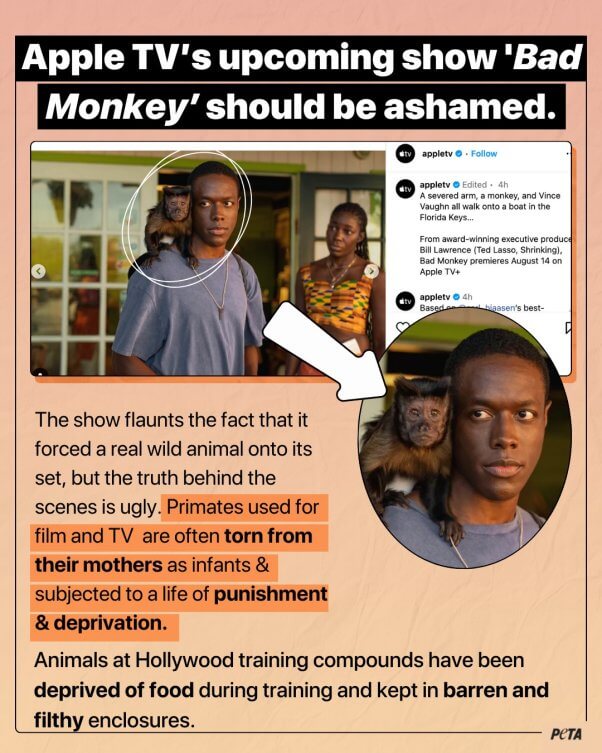Are Chimpanzees Still Used in Movies? The Truth Behind Hollywood and Chance’s Story
As seen in the recent docuseries Chimp Crazy, young chimpanzees and other primates need the comfort and care of their families in order to thrive. But Chance the chimpanzee was denied that. Instead of learning life skills from his mother, he was sold as a baby—ripped away from the life he deserved—and thrust into a world of exploitation. Chance became a Hollywood pawn.
Who Was Chance the Chimpanzee?
Chance most famously appeared in Martin Scorsese’s The Wolf of Wall Street at the suggestion of its star, Leonardo DiCaprio. When Chance wasn’t on set, he was forced into degrading circus-style shows at the misleadingly named Big Cat Habitat.

The four-part HBO docuseries Chimp Crazy, now streaming on Max, dives deep into Chance’s story, exposes the dark side of Hollywood’s use of primates, and highlights PETA’s groundbreaking lawsuit against the Missouri Primate Foundation along with breeder Connie Casey and broker Tonia Haddix. The riveting footage shines a light on the horrors faced by chimpanzees and other primates who are trafficked into the entertainment industry and the pet trade.
Thanks to relentless campaigns by PETA and other animal advocates, Hollywood no longer uses great apes like chimpanzees in film and TV. This is a monumental victory for animal rights, but there’s still work to be done for primates exploited in entertainment. Now that the series has revealed Chance’s fate, it’s time for stars like Leo to help primates by agreeing never to work with them again.
Monkeys and Other Primates Are Still Exploited in Hollywood
Although we’ve made great strides in protecting great apes, Hollywood is still exploiting smaller primates, including capuchin monkeys, macaques, and lemurs. Popular shows like Ryan Murphy’s Ratched, FOX’s Animal Control, HBO’s House of the Dragon, and Apple TV+’s Lady in the Lake have all used live primates—despite PETA’s persistent efforts to inform producers about the cruelty involved. Nearly 40,000 supporters joined us in urging Animal Control to leave wild animals alone, yet this and other programs risk undoing years of progress by continuing to use them.
Meet Crystal, Hollywood’s Most Famous Monkey
Capuchin monkeys are the most exploited species of primate currently used in the entertainment industry. Crystal, a capuchin who has appeared in more than 20 productions, is one of its most famous victims. Instead of exploring and foraging in nature with others of her kind, choosing a mate, and raising her own young, she’s been forced to perform in productions like Steven Spielberg’s The Fabelmans with Paul Dano and, most recently, in Apple TV+’s Bad Monkey starring Vince Vaughn. And although her “toothy grin” might seem endearing to many viewers, it’s actually a sign of fear and distress known as a “fear grimace.” This misunderstood behavior shows the deep psychological toll that being exploited for entertainment takes on primates like her.

The Reality of Primates in Entertainment
PETA’s undercover investigations and law-enforcement probes into animal suppliers for the film and TV industries have exposed handlers who whip animals and keep them in deplorable conditions. One prominent supplier kept monkeys in waste-strewn enclosures that went uncleaned for four days, according to a worker.
The suffering begins early for most of these animals. Shortly after birth, primates are typically separated from their mothers and denied the care and protection they need for healthy development, which can result in extreme physical and psychological distress. As they mature and become unmanageable or simply no longer profitable, many of them are discarded at seedy roadside zoos and other substandard facilities, where they may suffer for years without proper nutrition or veterinary care.
The Future of Monkeys and Other Primates in Hollywood: CGI and Humane Options
Fortunately, viewers are waking up to the truth: Animals aren’t props—they’re individuals. And filmmakers are taking note. Movies such as The Lion King and The Jungle Book brought Simba, Rafiki, Baloo, and Shere Khan to life without forcing a single animal to perform. The entire modern Planet of the Apes franchise centers on primates, yet not a single real one has been used! Shows like The Last of Us, 3 Body Problem, The Walking Dead, The Umbrella Academy, It’s Always Sunny in Philadelphia, and Peacemaker have featured stunningly realistic primates by using humane technology such as CGI and animatronics, proving there’s no legitimate excuse to exploit animals for the sake of entertainment. The future of filmmaking is compassionately animal-free.
How You Can Help Animals Exploited for Entertainment
If you see a real primate being used in a movie or TV show, comment on the social media pages of the studio and filmmakers to let them know why it’s not OK to exploit animals. Similarly, thank them when they use CGI and other humane technology.
If you’re concerned about the use of primates in a production, or if you know anyone working on a set with animals, alert PETA’s Animals in Film and Television division right away at PETA.org/Report.
Learn more about Chance’s story by watching Chimp Crazy, now streaming on Max.

